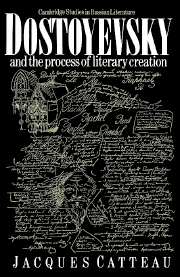Book contents
- Frontmatter
- Contents
- Preface to the English edition
- List of abbreviations
- General editor's note on transliteration and references
- General introduction
- PART I The creative environment
- Introduction
- 1 Forms of creativity in embryo
- 2 The heritage
- 3 The heritage: literature
- 4 The heritage: history and philosophy
- 5 Illness
- 6 Money
- PART II The process of creation
- Part III Time and space in the world of the novels
- Conclusion
- Notes
- Select bibliography
- Index of names
5 - Illness
Published online by Cambridge University Press: 18 December 2009
- Frontmatter
- Contents
- Preface to the English edition
- List of abbreviations
- General editor's note on transliteration and references
- General introduction
- PART I The creative environment
- Introduction
- 1 Forms of creativity in embryo
- 2 The heritage
- 3 The heritage: literature
- 4 The heritage: history and philosophy
- 5 Illness
- 6 Money
- PART II The process of creation
- Part III Time and space in the world of the novels
- Conclusion
- Notes
- Select bibliography
- Index of names
Summary
Immediately a place
Before his eyes appeard, sad, noysom, dark,
A Lazar-house it seemd, wherein were laid
Numbers of all diseas'd, all maladies
Of gastly Spasm, or racking, torture, qualmes
of heart-sick Agonie, all feavorous kinds,
Convulsions, Epilepsies, fierce Catarrhs,
Intestin Stone and Ulcer, Colic pangs,
Dropsies, and Asthma's, and Joint-racking Rheums.
Dire was the tossing, deep the groans, despair
Tended the sick …
John Milton, Paradise Lost (ix, 477–87)For most readers, illness is the key word in Dostoyevsky's creation: the man is sick and the whole of his work – characters, writing, plots, massacres, lighting – is permeated with sickness. This idea is deeply rooted because it implies that the overpowering effect of Dostoyevsky's genius, his disturbing and uncomfortable analysis may be discounted as the results of his illness, an illness with mysterious and terrifying names: the falling sickness, the comitial sickness, sacred sickness, St John's evil, epilepsy. In recent times, some of the legends attached to epilepsy have been cleared away; but psychoanalysis has filled the gap by attaching to Dostoyevsky the allpowerful Oedipus complex, in its most interesting form, the obsession with parricide. However every legend is based on some fact and illness certainly played a part in Dostoyevsky's life and work. Our main task here is to examine the relationship of Dostoyevsky's illness with his creative genius.
The legend: the lazar-house of the novels
Dostoyevsky's works have a morbid side, and Dostoyevsky himself was mainly responsible for the disturbance they caused and the accusations brought against them while he was still alive.
- Type
- Chapter
- Information
- Dostoyevsky and the Process of Literary Creation , pp. 90 - 134Publisher: Cambridge University PressPrint publication year: 1989

